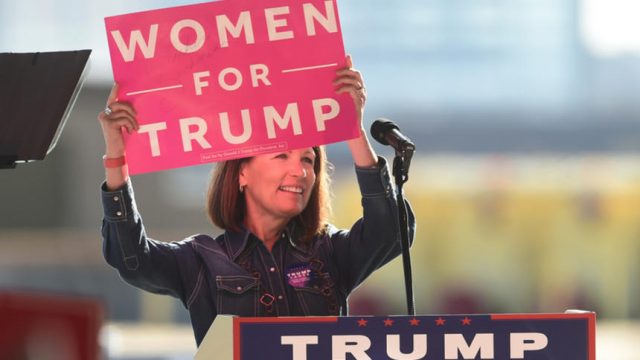Democrats Figuring Out How to Talk to Trump Voters Is Why the Electoral College Is a Wonderful Thing

Former Congresswoman Michele Bachman shows their support for Presidential candidate Donald Trump at a rally at the Minneapolis St. Paul Airport, Sunday, Nov. 6, 2016. (Pioneer Press: Scott Takushi)
According to reports, Democrats are now putting on seminars aimed at figuring out how to talk to Americans who aren’t inclined to vote for Democrats.
“Democratic members of Congress are learning how to converse with regular people during a retreat this week to prepare to battle President Donald Trump,” the Washington Free Beacon reports.
“One session at the Democratic retreat focused on ‘speaking to those who feel invisible in rural America’,” the report continues. “Two others were titled ‘Listening to those feel unheard’ and ‘Rising America–They feel unheard too.'”
This is a positive development, and I applaud Democrats for taking this step.
I’m also happy that the Electoral College is forcing Democrats to seek out these conversations.
There has been much griping from the left about the Electoral College since election day, obviously because it gave control of the White House to Donald Trump despite Hillary Clinton winning the popular vote.
That’s a simplistic view of the situation born of partisan angst, I’m afraid. The Electoral College means national candidates in America must win much more than a simple majority of the vote, and that’s a good thing.
Without the Electoral College Hillary Clinton would be in the White House with a mandate from a very small, though very densely populated, portion of the United States:

Put simply, if all that mattered was the popular vote, Democrats could control the White House as long as they control urban areas in places like California, Washington, New York, and Illinois. She wouldn’t have to worry at all, really, about what people in “fly over country” have to say.
But that would be a recipe for disaster in a country as large and diverse as ours. It would create resentment and faction far beyond what we’re now experiencing.
Yes, Hillary Clinton won the popular vote, but only by about 2 percentage points. Nearly 63 million Americans cast their ballots for Donald Trump. Those people matter too.
When I think about the Electoral College I also think about the filibuster in the U.S. Senate, another oft-derided mechanism of American governance. Those who are critical of the filibuster describe it as an obstruction to majority rule, and I suppose it is, though I think of it as a sort of mandate for bipartisanship.
A requirement that the majority political faction get at least some level of buy-in from the minority faction before advancing policy.
The Electoral College functions the same way for elections. It means that national candidates can’t necessarily win elections simply by appealing to voters in urban and/or coastal areas. They must also have some level of appeal to voters living in more rural areas.
Which is why Democrats are trying to figure out how to appeal to voters in places like Wisconsin and, yes, even North Dakota.
That’s a formula for a better sort of national governance, at least in the aggregate.
The jury is still out on whether or not Trump will be a good leader for our country, but we shouldn’t use the 2016 election as impetus to get rid of an electoral mechanism which has largely served our country well.




